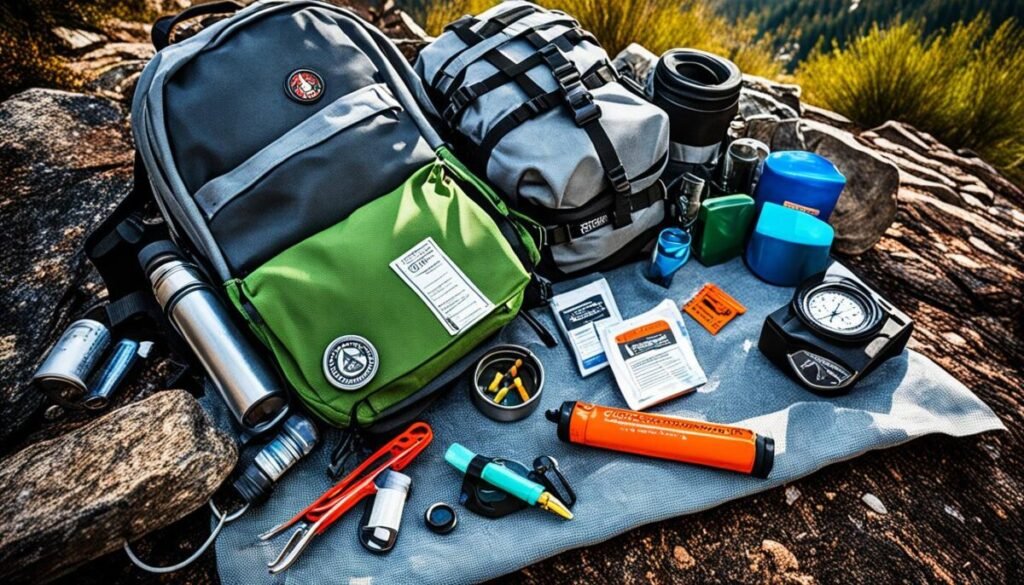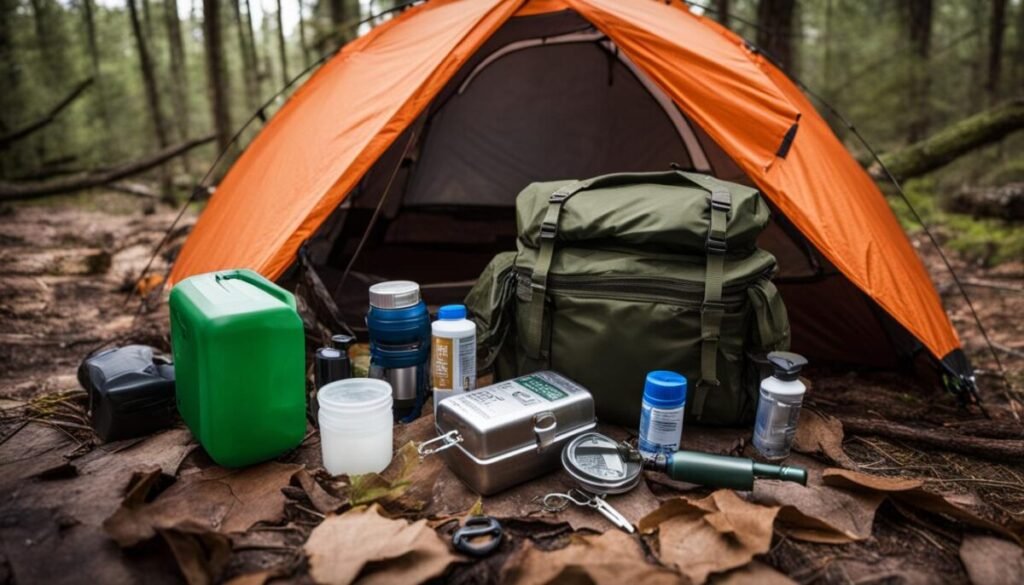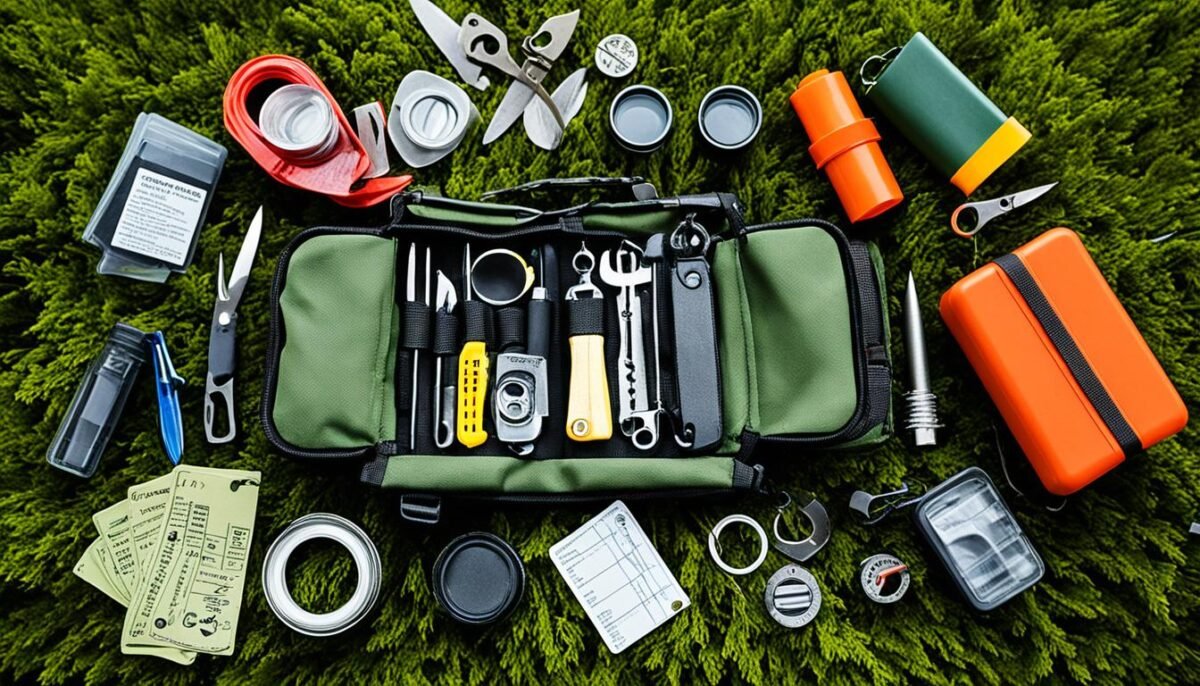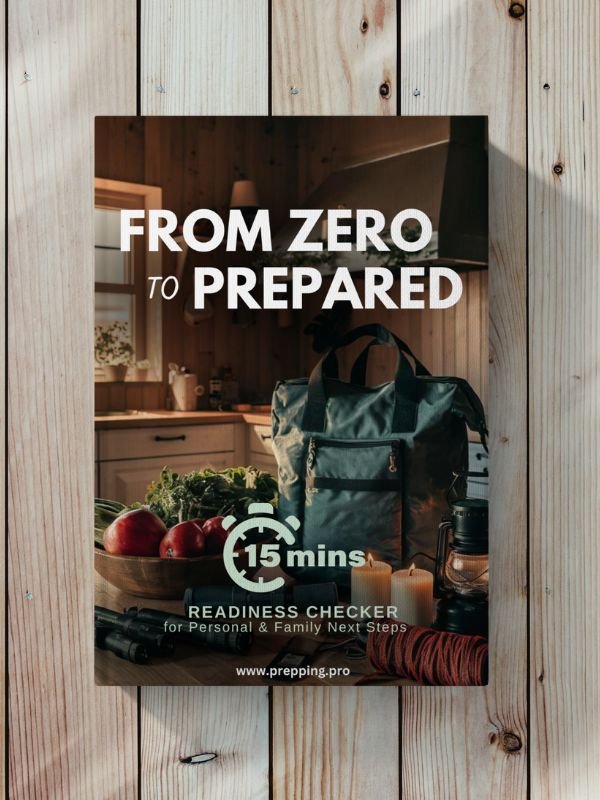An average of 67% of people who go missing in the wilderness every year are ill-equipped for survival.
In this article, discover the must-have camping gear essentials for your outdoor survival tools kit that keeps you safe and amps up the fun on every adventure.
Whether you hike through a dense forest or camp under the stars, an all-encompassing emergency preparedness supplies kit can make the difference between a memorable adventure and a perilous ordeal.
Your camping gear essentials should always include items like a fire starter, a durable survival knife, a topographic map, and a compass. Moreover, incorporating a first aid kit, a loud emergency whistle, and paracord into your wilderness survival equipment can significantly boost your readiness for unexpected scenarios. Hydration is also crucial with a water filtration device and a metal bottle to help quench your thirst. Illumination tools like a flashlight or headlamp, and utilities for building a shelter, such as a tarp, further round out a comprehensive kit.
Key Takeaways
- A well-stocked outdoor survival tools kit is key to ensuring your safety and preparedness in the wilderness.
- Your camping gear essentials should always include a fire starter, a survival knife, a topographic map, and a compass.
- Incorporating a first aid kit, a loud emergency whistle, and paracord into your wilderness survival equipment can greatly enhance your readiness for unexpected scenarios.
- Hydration and energy conservation are crucial to survival. Always include a water filtration device and a metal bottle for water storage in your kit.
- Illumination tools such as a flashlight or headlamp and shelter-building utilities like a tarp are important components of a comprehensive survival kit.
Table of Contents
Core Items for Navigation and Illumination
Navigating the great outdoors, whether it’s a steep mountain trail or a simple forest hike, often requires the precision offered by a tactical survival gear. A topographic map and a reliable compass form the foundation of your hiking gear checklist. As you immerse yourself in the wilderness, these items are your lifelines—they safeguard against missteps and keep disorientation at bay.
For these tools, size does matter, and you don’t want bulky items aggravating your journey. Opt for compact versions that can slip handily into your backpack or even your pockets. The beauty of these old-school tools is that they perform unswervingly, even in the absence of electricity.
Any compact survival kit worthy of the name should also equip you with tools for another fundamental aspect of wilderness survival – illumination. Nights, especially in unfamiliar territory, can be challenging to navigate.
You must not overlook the critical role light sources play in your survival. Vital for tasks ranging from setting up the camp spot, setting night watchers, preparing food, to even warding off nocturnal creatures. A reliable source of light such as a flashlight or a headlamp is indispensable.
Size again matters, with the spotlight on compact, lightweight, and easy-to-store options. Take into account features like an adjustable beam, long battery life, and water-resistance while choosing your light sources.
| Gear | Pros | Cons |
|---|---|---|
| Topographic Map | Reliable, detailed terrain information | Requires skill to understand |
| Compass | Works without electricity, reliable for direction | Needs calibration |
| Flashlight/Headlamp | Flexible use, high visibility, long battery life | Can be heavy with batteries |
Proper illumination and reliable navigation aids are among the key components of a survival gear kit. Choosing the best fit for your needs and preferences can make all the difference when it comes to surviving in the wild. Look for quality, durability, and proven effectiveness in your tools. Remember, your outdoor survival gear is as strong as its weakest link. Go out and explore with confidence, but always remember to tread with caution and respect towards nature.
Essentials for Hydration and Water Purification
In the realm of outdoor adventure essentials, few things are as critical as a stable supply of water. Water isn’t just a mere thirst-quencher. It’s virtually the sealant of survival, playing a crucial role in keeping you hydrated, aiding in wound cleaning, and providing for food preparation. Hence, as part of your portable emergency survival kit, proper provisions for water storage and purification should be well-considered.
It’s not out of place to carry more water than you anticipate needing. Yet, in a survival scenario, you may find yourself relying on available natural water sources. So equipping yourself with efficient water purification systems becomes essential. Devices such as the Sawyer Mini or Grayl Geopress, recognized brands of wilderness survival equipment, are excellent picks. These units can help in the collection and treatment of water, ensuring you have safe drinking water at all times.
| Purification Device | Features | Applications |
|---|---|---|
| Sawyer Mini | Compact, High performance, 0.1 Micron absolute filtration | Removes bacteria, protozoa, E. Coli, giardia, vibrio cholera, Salmonella typhi |
| Grayl Geopress | Rapid purification, One-press design, Rechargeable cartridge | Purifies water of viruses, bacteria, sediment, chemicals, heavy metals |
Another piece of equipment that’s recommended is a metal water bottle. A single-walled version can serve a dual purpose. Apart from storing your treated water, it can also be used for boiling water to kill any microorganisms if necessary. The durability of metal bottles also ensures they’re more likely to withstand rough conditions. Opting for metal over plastic also aligns with the outdoor ethic of ‘leaving no trace’ as it’s more eco-friendly.
Fire-Starting Equipment: Igniting Your Chances of Survival

Among your emergency preparedness supplies and camping gear essentials, a fire starter ranks as one of the most important tools in your outdoor survival tools kit. An effective fire starter addresses basic human needs such as warmth and rest, as well as enabling safe water purification and food preparation.
Various options exist for fire-starting equipment, catering to different needs, skills, and preferences. These range from the multifunctional Firebiner, equipped with both a sparking fire starter and a small blade, to a straightforward 6-inch long ferro rod.
Remember: being able to start a fire is not just about comfort. It can deter predators, signal for assistance, and ultimately be a game-changer in extending your chances of survival.
Fire-starting tools come in different forms, each with their own unique features and benefits:
- Spark wheels are compact and lightweight, producing a shower of sparks to ignite tinder easily.
- Magnesium starters double as a reliable tinder source, producing a hot, intense flame even when damp.
- Ferro rods or “fire steels” are a popular choice that works in all conditions, creating hot sparks to light tinder.
- Friction-based fire starters like fire bows, hand drills, or fire plows are more challenging to use, but can be valuable backup options in a pinch.
No matter what type of fire starter you choose, remember that the technique goes hand-in-hand with the tool. So, be sure to practice regularly with your gear – your survival could depend on it.
Outdoor Survival Tools Kit: The Foundation for Self-Sufficiency
Building a sound compact survival kit requires selecting items that are versatile yet sufficient for an individual’s specific needs. It forms as the foundation of outdoor self-reliance, with a distinctive focus on analytics and personal strategies. The fundamental items of this kit often involve detailed considerations, including survival knives, multi-purpose tools, and matchless customization according to unique skills.
Durability and Versatility of Survival Knives
Knives play a significant role in any tactical survival gear set, as these tools offer far more uses than mere chopping and cutting. Their selection relies heavily on the user’s comfort and anticipated needs. For example, many explorers might prefer compact, machete-like knives suitable for wood chopping, while others might insist on Swiss Army knives with their multifaceted functionality.
Importance of Multi-Functionality in Survival Gear
The essence of surviving wilderness challenges lies in effective multi-tasking, which demands highly versatile tools. Having a piece of equipment that can serve multiple purposes can greatly reduce the load and increase adaptability in varied scenarios. Tools such as multi-tools equipped with not just a knife, but also scissors, files, mini screwdrivers, canopener, bottleopener, etc., come in handy, where every ounce of weight and every bit of space counts.
Customizing Your Kit to Match Your Skills
True wilderness survival equipment is a reflection of the bearer’s skills and expertise. It suggests that every survival kit should be individually tailored to suit the particular abilities and comfort-zone of the user. Additional items like a tactical pen might be added if note-taking is an expected part of your survival strategy. Your personal abilities, coupled with a well-customized survival gear, can ensure greater chances of enduring tough situations outdoors.
| Component | Function | Preferred Features |
|---|---|---|
| Survival Knife | Cutting, Chopping, Shaping | Compact, Versatile, Durable |
| Multi-Tool | Various tasks | Multi-functional, Compact, Sturdy |
| Tactical Pen | Note-taking | Light, Durable, Efficient |
Remember, adding more tools to your kit doesn’t necessarily improve its effectiveness. In fact, a compact survival kit with fewer, multipurpose items is often more beneficial and practical. Learn to harness the power of each tool and personalize your kit to match your skills, thus ensuring greater self-sufficiency in wilderness survival.
The Significance of a Reliable Shelter

For any outdoor adventure, a reliable shelter is an essential foundation of your survival. As one of the core requirements of human survival, shelter provides protection from the elements, a sense of security, and can have a significant psychological impact. With the right emergency preparedness supplies on hand, you can ensure yourself a safe haven, no matter where you find yourself.
Choosing the Right Tarp and Sleeping Bag
Your choice of a durable tarp can make all the difference in enduring rough weather conditions. A versatile piece of gear, a tarp can serve as a ground pad, a rain catch, or even a snow melting surface. It’s lightweight, compact, and can fit easily in your survival kit. Selecting one that meets your specific environmental needs can make your outdoor adventure a lot more comfortable.
Accompanied by the right sleeping bag configurations, your shelter can provide you with the restful sleep necessary for survival. The choice of sleeping bag should depend on the climatic conditions you anticipate to encounter. For example, in a cold environment, a 0-degree sleeping bag, designed to keep your body warm in freezing temperatures, will be remarkably beneficial.
Adapting to Severe Weather Conditions
Severe weather is unpredictable, and you never know when you might find yourself in a precarious position. That’s where a quality space blanket can be literally life-saving. Compact, light, and with capabilities to retain nearly 90% of your body heat, this blanket can be the difference between survival and succumbing to hypothermia.
In preparing for unforeseen circumstances, you should ensure your gear includes items that can adapt to sudden weather changes. This adaptability can significantly improve your survival chances in the wilderness.
| Item | Use |
|---|---|
| Tarp | Can serve as a ground pad, a rain catch, or even a snow melting surface depending on your needs. |
| Sleeping Bag | Keeps body warm in freezing temperatures; choice depends on the climatic conditions anticipated. |
| Space Blanket | Keeps body warm by retaining nearly 90% of body heat, crucial in cold climates. |
Survival Clothing: Layering for Unpredictable Climates
Your first line of defense against the unpredictability of nature manifests in the form of effective clothing. Non-cotton, quick-drying materials are key, with an emphasis on wool or synthetic fabrics, that can insulate even when wet, forming the building blocks of your camping gear essentials.
Layering plays a vital role, especially when dealing with unpredictable climates. Let’s navigate through the key considerations of this hiking gear checklist.
- Base Layer: Long underwear that wicks moisture away from your body, keeping you dry and warm. Wool is the gold standard for this essential layer.
- Mid Layer: This layer acts as the primary insulation. Wool socks and synthetic shirts, effectively trapping your body heat.
- Outer Layer: For protection against the elements like rain, snow, and wind. Specialized items like a windbreaker or a solid rain jacket would constitute this.
The finishing touches come in the form of appropriate headwear, such as a fleece or wool hat. Durability and functionality extend to your feet, with weather-appropriate footwear, and specialized items like boot gators cropping up as vitally important in harsh terrain.
Altogether, these components form part of your outdoor survival tools kit and serve as your primary line of defense against the elements.
First Aid Preparedness: A Lifeline in the Wilderness
Surviving the wilderness goes beyond having just the right outdoor survival tools kit. It is also essential to be equipped with a comprehensive first aid kit—this is where emergency preparedness supplies come in. These supplies can serve as a crucial lifeline in such extreme settings, capable of treating injuries and illness that could potentially become life-threatening in the absence of prompt and proper medical attention.
Components of an Essential First Aid Kit
Your first aid kit should not merely tend to minor cuts and scrapes but also extend to more serious injuries. It should include medical supplies for treating larger wounds, managing fractures, and even steri-strips for uneven lacerations. A complete first aid kit comprises a variety of adhesive bandages, antiseptic wipes, tweezers, medical tape, safety pins, pain relief medication, and a pair of gloves, among other things.
- Tweezers
- Medical tape
- A variety of adhesive bandages
- Safety pins
- Antiseptic wipes
- Pain relief medication
- A pair of gloves
- Steri-strips
Dealing with Medical Emergencies When Help is Miles Away
In the wild, without immediate access to professional medical assistance, your knowledge of emergency medical care becomes vital. Along with a well-stocked first aid kit, a basic understanding of emergency medical procedures, such as the correct method to clean wounds or immobilize fractures, can make all the difference. Specialized first aid courses can equip you with these essential skills, allowing you to respond correctly and confidently during a medical crisis.
In conclusion, never underestimate the role of a comprehensive first aid package in your outdoor survival toolkit. Preparedness—by having the apt first aid kit essentials—is indeed the best tool for survival.
Understanding Survival Tools Necessity
As you embark on your journey into the wilderness, it is imperative to understand the importance of equipping yourself with the right outdoor adventure essentials. The true essence of venturing into the great outdoors lies in experiencing the thrill and charm of the untamed, while also acknowledging its potential hazards. Appreciating the necessity of wilderness survival equipment and tactical survival gear plays a crucial role in ensuring a safe and fulfilling adventure.
Assessing the Dangers of Untamed Nature
Before setting foot into the wild, it’s significant to recognize the potential dangers that such raw environments can present. Unpredicted weather changes, unable to find direction, encountering wilderness creatures, or a sudden medical urgency can turn an exciting adventure into a dire survival situation. Therefore, owning a well-equipped survival tools kit becomes your key to handling any unexpected developments effectively.
The Basics of a Well-Equipped Survival Kit
At the very core of your survival kit should be certain indispensable tools. These include functional gear like a fire starter, a reliable knife, a compass for direction, and a topographical map that helps navigate various terrains. Moreover, there’s a necessity for specific gadgets that adapt to different survival scenarios. For instance, a loud whistle can serve the dual purpose of signaling for help and deterring wildlife. Similarly, paracords prove to be useful in a variety of situations, from fastening gear to acting as fishing lines or tripwires.
Emerging technology has also paved its way into survival gear, providing more efficiency and reliability. Devices like a Spot locator can be used to alert emergency services for immediate assistance, making it a valuable piece of your survival kit.
In conclusion, it’s essential to respect the unpredictability of nature and prepare accordingly, harboring the power of being self-sufficient through your adventure.
Conclusion
In closing, arming yourself with a well-equipped outdoor survival tools kit is not merely a choice, it is a necessity for every adventurer or camper preparing to venture into the wild. The fundamental aspects, from fire starting tools to water filtration devices, each serve a crucial purpose. The right navigation aids can keep you on course when everything seems lost. A multi-purpose survival knife is not only a potential lifeline but also an extension of your abilities in combating multiple survival challenges.
Adequate clothing, creating an appropriate shelter, and maintaining first aid readiness not only equip you for survival but also fortify layers of security when you confront the unpredictable forces of nature. Remember, choosing the clothes that regulate your body temperature and protect your skin is as important as selecting a sturdy tarp or a reliable sleeping bag to cushion you from harsh weather deviations. An essential first aid kit adds another protective layer, standing as your medical ally when professional help is out of reach.
Your portable emergency survival kit acts as a safety net in perilous situations, yet remember it is not just the tangible gear that gets you through. Wisdom lies not just in having the most expensive or extensive collection of outdoor gear but also in cultivating the knowledge and skills to use these camping gear essentials proficiently. Use your knowledge and skills hand in hand with your tools to increase your chances of survival, adapting and thriving in the face of outdoor emergencies.


